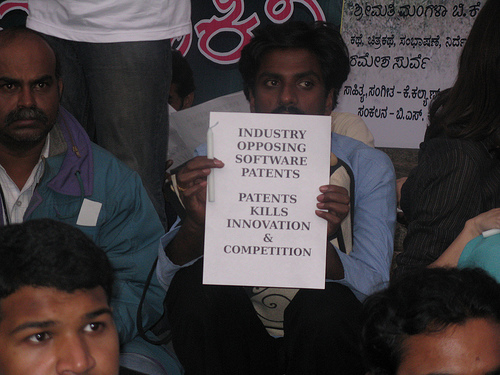
Summary: Richard Stallman to help New Zealand defeat software patents, which are mathematical monopolies based on the New Scientist; reform suffers setbacks and Microsoft is unable to obey patent law
Resistors
THE father of Free software, Richard Stallman, shall soon
speak about software patents in New Zealand. Here is an introduction/abstract.
In this insightful discussion, international Free Software advocate Richard Stallman (RMS) will argue that software patents seriously and significantly obstruct software development.
Software patents are patents that cover software ideas. Stallman will argue that they restrict the development of software to the point that the risk of legal action as a result of design decisions is dramatically raised. Stallman will also make the point that patents in other fields restrict factories, but in IT, software patents restrict every computer user and consumer.
Stallman was
giving such talks several years back when European activists staved off attempts to legalise software patents in Europe (Microsoft was among the large forces lobbying
for it). Similar
attempts are now being made
to legalise software patents in New Zealand where
Microsoft tries to
colonise,
not always successfully though.
Software is Mathematics
Here is a very recent article from the New Scientist, which is a distinguished publication. Therein we find a clear, scientific explanation of
why software is mathematics (and should therefore not be patentable).
To prove mathematically that the 7500 lines of its kernel's code were secure, Gerwin Klein of NICTA and his team first had to come up with a mathematical method to express the code. "In the end, programs are just mathematics, and you can reason about them mathematically," says Klein.
One can join
the latest discussion about software patents at Groklaw, where the invaluable finding shown above was first identified and brought to more people's attention.
Reform
As we
mentioned the other day, the Rick Frenkel (
aka Patent Troll Tracker) case [
1,
2,
3,
4,
5,
6,
7] is now settled and
Law.com offers some more coverage. The sad thing is that those patent trolls managed to gag and perhaps permanently silence their biggest critic. According to Patently-O, on Obama's agenda there are
more intellectual monopolies, not less (
no surprise there). Here are
some details.
President Obama's speech today focused on its newly formed "strategy for American innovation" -- his "strategy to foster new jobs, new businesses, and new industries by laying the groundwork and the ground rules to best tap our innovative potential. . . .
[...]
Protect intellectual property rights. Intellectual property is to the digital age what physical goods were to the industrial age. We must ensure that intellectual property is protected in foreign markets and promote greater cooperation on international standards that allow our technologies to compete everywhere. The Administration is committed to ensuring that the United States Patent and Trademark Office has the resources, authority, and flexibility to administer the patent system effectively and issue high-quality patents on innovative intellectual property, while rejecting claims that do not merit patent protection.
There is some very strong language here; it is almost propaganda-inspired, as though it was written by patent lawyers to advance their personal agenda. The Director of the USPTO, David Kappos, says that patents are a "20-year monopoly", which is not the same as referring to patents as a "property", a "right", "protection", or intellect. It's more of a blockade, but monopolies love those.
Microsoft
Microsoft still
treats Exchange protocols as patents -- a practice which is wrongly seen as acceptable (or a "necessary evil") by some players in the relevant sector; Google is
among the victims of ActiveSync, others being Linux vendors which succumbed to
Microsoft's patent plot. The funny thing is that
Microsoft ignores patent law when it suits its needs. Here is the
latest turn of events in the i4i case, as described in the Wall Street Journal.
I4i Inc. doesn't want to prevent Microsoft Corp. (MSFT) from selling its flagship Word product, it just wants Microsoft to remove i4i's technology.
And the closely held Toronto company, which won its patent-infringement case against Microsoft in May, doesn't appear willing to compromise on this point. "You can never say never," said i4i Chairman Loudon Owen, regarding a settlement with Microsoft, "but we're here to build our business and we're here to compete."
More information about the i4i case can be found in [
1,
2,
3,
4,
5,
6,
7,
8,
9,
10]. It's an embarrassment to Microsoft and it shows the company's endless hypocrisy when it comes to software patents.
⬆
“The only patent that is valid is one which this Court has not been able to get its hands on.”
--Supreme Court Justice Jackson

